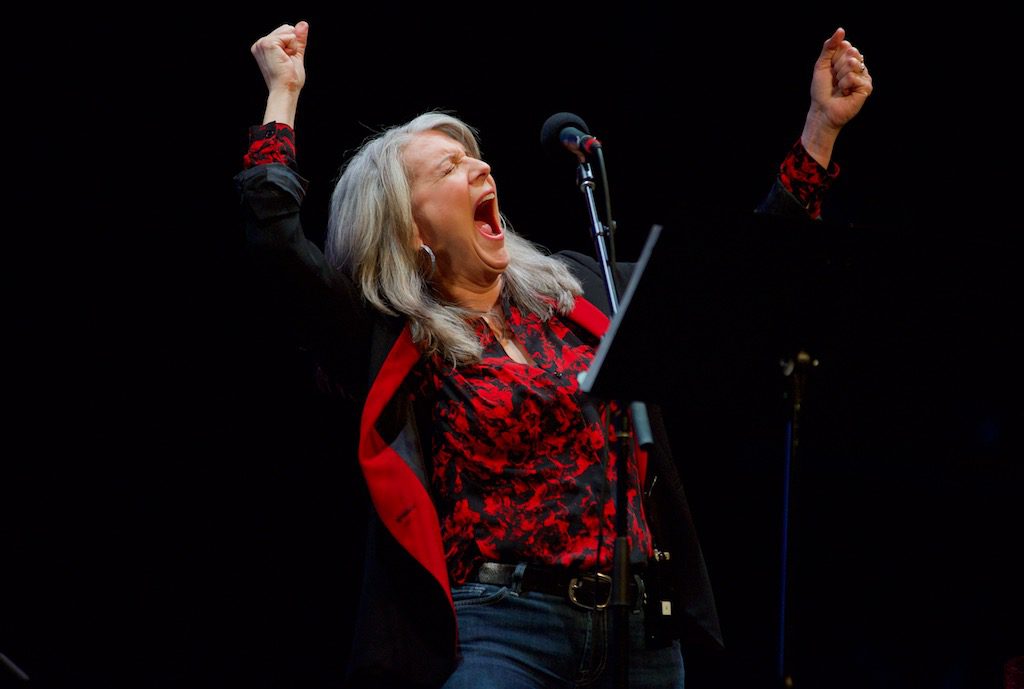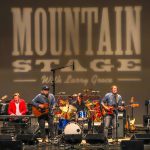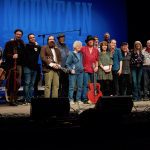THROUGH THE LENS: ‘Mountain Stage’ Maintains its Musical Circle

Kathy Mattea - Mountain Stage 2020 - Photo by Amos Perrine
Mountain Stage, public radio’s longest-running live roots music radio show, is aired on over 240 NPR stations, and streamed or downloaded via the NPR Music website as well as its own. It has survived many adversities over its 37 years, including nearly losing its home venue, a threatened state funding cut-off, and even blizzards where the audience, Mountain Stage staff, and guests had no idea how they’d get home. But COVID-19 hit like a ton of bricks: Four shows into its 37th season, the show, like the rest of the music world, came to a grinding halt.
Nine announced shows were soon thereafter canceled. Those shows were to have included some exciting first-time guests: Robert Plant, Yola, Nicole Atkins, and The Haden Triplets. The Robert Plant show, which was to be held at the Clay Center (a significantly larger, more stately venue than the show’s usual home at the Culture Center Theater at the West Virginia State Capitol in Charleston), sold out within minutes.
The cancellations were a significant blow not just to the show and its many fans but also to the local economy, as the show attracts many out-of-state and international visitors. As part of the audience warmup before each show, those folks are asked to identify themselves. They are then welcomed into the Mountain Stage family. It’s part of the tradition.
Perseverance and Adaptation
Also part of tradition in West Virginia is perseverance and adaptation. With community assistance, Mountain Stage revived itself by presenting three shows in November and December, with artists including Chuck Prophet, Ranky Tanky, Darrell Scott, S.G. Goodman, and more. Those shows did not have an audience but took all necessary precautions for staff, stage crew, and guests. As Executive Producer Adam Harris told me, “Thanks to a generous grant from the Greater Kanawha Valley Foundation, we were able to purchase personal protective equipment, extra wind screens for our microphones, branded masks for our team, and to rent and then purchase our own air scrubbing devices. The grant also helped us facilitate a ‘run-through’ show that wasn’t broadcast, so we could integrate our protocols without the pressure of losing a radio broadcast.”
Harris continued, “Credit is due to our staff and band for their dedication to our safety protocols when we started planning to record again. I commend them for learning some new habits when it came time to do the things they’ve been doing the same way for several decades. They knew we had a reputation to uphold, and that it was crucial to prove our commitment to doing things safely.”
Those three shows were streamed live on Mountain Stage‘s website and NPR Music’s website. The shows were filmed by West Virginia Public Broadcasting professionals and, unlike a lot of what is streamed via the web, the picture and sound qualities were stellar. Those shows will soon be available for additional viewing via NPR Live Sessions.
Here’s what Associate Producer Vasilia Scouras told me about those shows: “It was a departure from the norm, but it still felt really good to safely gather our team and artists to create new content after a long hiatus. The Mountain Stage Band and some of our production team would scatter throughout the theater to watch and applaud performers. It was weird, but I also felt a strong sense of gratitude. I was like, ‘Wow, I have the privilege of feeling this performance right now as it’s happening.’ I knew I had been missing live music, but to be on the receiving end of that energy while I sat rows apart from my masked colleagues was quite lovely, albeit a little surreal.”
It was eerie from another viewpoint as well, one full of irony. Larry Groce, host and co-founder, always said from the stage that what set Mountain Stage apart from other live music on the radio was it was done before a live audience, where other live sets were done in a studio with only radio staff in attendance. During the last three shows the stage crew was excellent as always, and the guests performed flawlessly, but still there was an unmistakable emptiness. It felt as though the circle had been broken. While I have always intellectually known that the audience is an integral part of the musical experience, it is another thing altogether to experience its absence on an emotional level.
The Year Ahead
While Mountain Stage’s first shows of 2020 are currently being re-aired, those last three shows will begin broadcasting next month. The only live show that has been announced for 2021 is one that will take place outdoors in a football stadium in April as part of the City of Huntington’s sesquicentennial celebration, with full safety protocols in place.
Let’s hope that with rational adults in charge of national COVID-19 policy, Mountain Stage and live music with an audience everywhere can relatively soon be revived, and the circle once again unbroken.
Photos of guests on the 2020 shows are below.
- Nellie McKay – Mountain Stage 2020 – Photo by by Melody Gwilliam
- Kathy Mattea – Mountain Stage 2020 – Photo by Amos Perrine
- Dom Flemons in 2020 (photo by Amos Perrine)
- Glen Phillips – Mountain Stage 2020 – Photo by by Melody Gwilliam
- Emily Scott Robinson – Mountain Stage 2020 – Photo by Amos Perrine
- Hot Club of Cowtown – Mountain Stage 2020 – Photo by by Melody Gwilliam
- Larry Groce, Adam Harris, Steve Hill and Julie Adams – Mountain Stage 2020 – Photo by Amos Perrine
- Diana DeMuth – Mountain Stage 2020 – Photo by Amos Perrine
- Keller & The Keels – Mountain Stage 2020 – Photo by Amos Perrine
- Town Mountain – Mountain Stage 2020 – Photo by Amos Perrine
- Fruition – Mountain Stage 2020 – Photo by Amos Perrine
- The End of America – Mountain Stage 2020 – Photo by Amos Perrine
- Peter Mulvey & Mountain Stage Band – Mountain Stage 2020 – Photo by Amos Perrine
- The Small Glories – Mountain Stage 2020 – Photo by Amos Perrine
- Russell Moore & IIIrd Time Out – Mountain Stage 2020 – Photo by Amos Perrine
- Chris Barron – Mountain Stage 2020 – Photo by by Melody Gwilliam
- Christopher Paul Stelling – Mountain Stage 2020 – Photo by Amos Perrine
- Jake Shimabukuro – Mountain Stage 2020 – Photo by Amos Perrine
- The Mastersons – Mountain Stage 2020 – Photo by Amos Perrine
- Joe Pug – Mountain Stage 2020 – Photo by Amos Perrine
- Mountain Stage Finale – Mountain Stage 2020 – Photo by Amos Perrine
- Bob Thompson – Mountain Stage 2020 – Photo by Amos Perrine
- Railroad Earth – Mountain Stage 2020 – Photo by Amos Perrine
- Finale – Mountain Stage 2020 – Photo by Amos Perrine
- S.G. Goodman – Mountain Stage 2020 – by Amos Perrine
- Todd Burge – Mountain Stage 2020 – by Amos Perrine
- The Sea The Sea – Mountain Stage 2020 – by Amos Perrine
- Hot Club of Cowtown – Mountain Stage 2020 – Photo by by Melody Gwilliam
- Larry Groce – Mountain Stage 2020 – Photo by Amos Perrine
- Rene Marie – Mountain Stage 2020 – by Amos Perrine
- Kim Richey & Chuck Prophet – Mountain Stage 2020 – by Amos Perrine
- Nellie McKay & Bob Thompson – Mountain Stage 2020 – Photo by by Melody Gwilliam
- Sierra Ferrell – Mountain Stage 2020 – by Amos Perrine
- Jonathan Something – Mountain Stage 2020 – Photo by by Melody Gwilliam
- Darrell Scott – Mountain Stage 2020 – by Amos Perrine
- Susan Werner & The Mountain Stage Band – Mountain Stage 2020 – by Amos Perrine








































